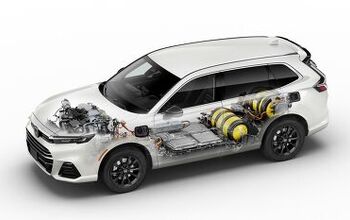Germany Forced to Appear Proactive as Anti-diesel Prejudice Swells in Europe

With Paris, Madrid, Athens, and Mexico City all pledging to ban diesel vehicles from entry within the next few years, the fuel’s future doesn’t look particularly bright. While citywide bans like these are becoming increasingly popular in Europe, diesel vehicles still account for almost half of the continent’s registered vehicles.
Germany, which has been speedily moving away from the fuel since Volkswagen’s emissions fiasco, provided more than its fair share of those diesel-powered models. It’s been mulling over how to handle it’s own regulatory matters pertaining to the fuel and the rest of the European Union’s intense pressure doesn’t seem to have fazed it.
Instead of enacting the same transportation ban on diesel vehicles as seen in Paris, Germany has decided to furnish its automakers with the opportunity to clean up their act. Industry officials and politicians have agreed to implement software updates on existing vehicles specifically to keep them eligible for operation within major metropolitan areas. Considering Mercedes-Benz just offered to “voluntarily” recall 3 million Euro-spec cars fitted with diesel engines, that’s incredibly good timing. Likewise, Volkswagen Group claims it will update 850,000 Porsche and Audi vehicles equipped with larger diesel motors.
The plan amounts to roughly 2 billion euros ($2.33 billion), with Germany’s automotive industry willing to expend around 100 euros per car. The benefit is that those potentially illegal vehicles get to stay on the road and the country looks like it actually did something. Ideally, it should result in some nine million existing vehicles conforming to Euro 5 or 6 emission standards — reducing NOx emissions by around 20 percent. However, when you look at some of the previous software-based emission fixes, a lot of those diesels behaved differently after being tuned while still emitting roughly the same amount of pollutants as before.
As difficult as this is to say, it may actually have been more responsible to ban diesels in major cities. While this is not an endorsement of the practice, banning diesels makes a future purchase less appetizing while also forcing current owners to use public transit solutions. Tangible results can be gained by legislating an unfair prejudice against diesel motors. Meanwhile, fixing an existing vehicle’s software just seems like a way to make it appear as if you’re doing something meaningful.
The European Union’s industry commissioner, Elżbieta Bieńkowska, addressed the continent’s transport ministers by threatening to ban diesel vehicles outright unless new and existing models are cleaned up before 2018. While a number of things would have to go her way to make that a reality, she can certainly draft a commission plan for the EU and get the ball rolling within that timeframe.
Reuters report s that a committee will be set up to measure the impact that updating diesel cars would have on individual communities and cities, with an aim of avoiding a sweeping ban. Auto industry executives and German Transport Minister Alexander Dobrindt are due to discuss diesel pollution at a summit on August 2nd.
Unlike Daimler and Volkswagen Group, BMW stated there was no reason for it to issue a voluntary recall ahead of the summit.

A staunch consumer advocate tracking industry trends and regulation. Before joining TTAC, Matt spent a decade working for marketing and research firms based in NYC. Clients included several of the world’s largest automakers, global tire brands, and aftermarket part suppliers. Dissatisfied with the corporate world and resentful of having to wear suits everyday, he pivoted to writing about cars. Since then, that man has become an ardent supporter of the right-to-repair movement, been interviewed on the auto industry by national radio broadcasts, driven more rental cars than anyone ever should, participated in amateur rallying events, and received the requisite minimum training as sanctioned by the SCCA. Handy with a wrench, Matt grew up surrounded by Detroit auto workers and managed to get a pizza delivery job before he was legally eligible. He later found himself driving box trucks through Manhattan, guaranteeing future sympathy for actual truckers. He continues to conduct research pertaining to the automotive sector as an independent contractor and has since moved back to his native Michigan, closer to where the cars are born. A contrarian, Matt claims to prefer understeer — stating that front and all-wheel drive vehicles cater best to his driving style.
More by Matt Posky
Latest Car Reviews
Read moreLatest Product Reviews
Read moreRecent Comments
- Aaron This is literally my junkyard for my 2001 Chevy Tracker, 1998 Volvo S70, and 2002 Toyota Camry. Glad you could visit!
- Lou_BC Let me see. Humans are fallible. They can be very greedy. Politicians sell to the highest bidder. What could go wrong?
- SPPPP Vibrant color 9 times out of 10 for me. There may be a few shapes that look just right in metallic gray, for example. There are a few nices ones out there. And I like VW "White Silver". But I'd usually prefer a deep red or a vibrant metallic green. Or a bright blue.
- 28-Cars-Later Say it ain't so, so reboot #6* isn't going to change anything?[list=1][*]V4-6-8 and High "Tech" 4100.[/*][*]Front wheel drive sooooo modern.[/*][*]NOrthSTARt.[/*][*]Catera wooooo.[/*][*]ATS all the things.[/*][*]We're *are* your daddy's Tesla. [/*][/list=1]
- MaintenanceCosts Can I have the hybrid powertrains and packaging of the RAV4 Hybrid or Prime with the interior materials, design, and build quality of the Mazda?

































Comments
Join the conversation
Personally, I wouldn't have a diesel car/truck/CUV. For locomotives, buses and semis, as well as other heavy equipment, fine.
Neither do I want a diesel. Smelly, dirty and noisy. I do not drive enough to justify the cost of a diesel. I would rather have a hybrid.